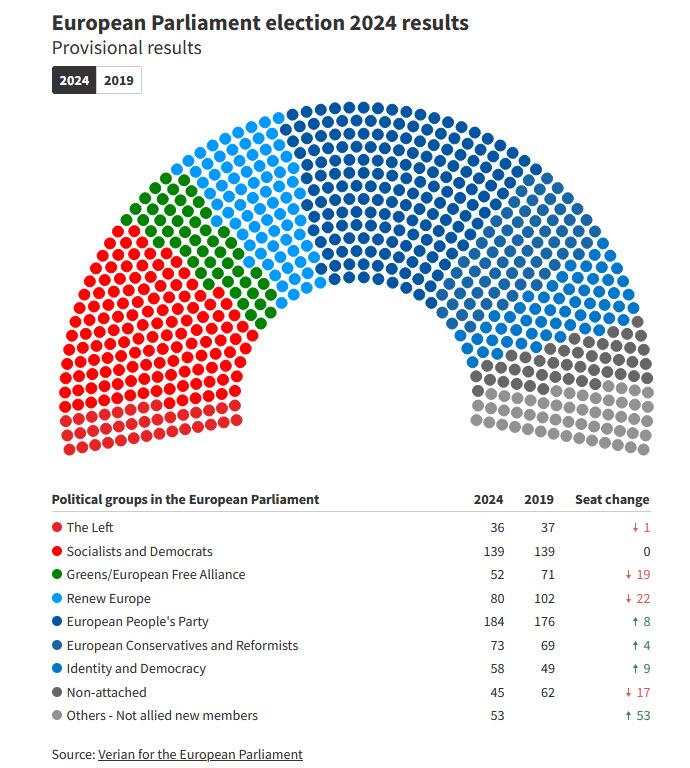From Rabobank via ZeroHedge, June 10:
By Stefan Koopman, Senior macro strategist at Rabobank
The European elections saw the centre hold its ground, albeit narrowly. The European People’s Party is poised to secure 184 seats in the new 720-seat Parliament, with the Socialists and the centrist Renew obtaining 139 and 80 seats respectively. This totals 403 seats for the grand coalition, a decrease from their current 417 seats in the old 705-seat Parliament. The hard-right ECR alliance of Giorga Meloni’s Fratelli d’Italia and the Polish nationalists are projected to rank fourth, with 73 seats, while the far-right Identity & Democracy group is expected to gain 58 seats. The Greens suffered a significant loss, dropping to sixth place with 52 seats, with the Left following at 36 seats, a slight decrease. There are also 45 seats for non-attached members, and 53 newly elected members that are not allied to any of the political groups yet. The overall left-right balance aligns with projections that indicated a lean but not a lurch to the right.
The coming weeks will see national parties formally choosing their European groups and this may alter the seat numbers. The battle for top positions commences at this week’s G7. The most coveted roles are the presidencies of the European Commission, European Council, European Parliament, and the EU Foreign Affairs Chief. The first EU summit of government leaders will be on June 27 and 28, where they will seek to nominate the new president of the European Commission. Nominations for the new European Commissioners will follow after the summer, with all nominees appearing at hearings in the European Parliament in the autumn. The new European Commission then begins on December 1, if everything goes according to plan.
So there’s still a long road ahead, but the implications are clear. Despite the center maintaining the majority, this is the most right-wing European Parliament ever elected. The results signal a European shift towards conservative and radical-right policies and away from progressive and green politics. The center will have to accommodate this shift over the coming years and will sometimes have to lean right to maintain a majority. It means that internal EPP politics will be a major factor in the direction of European policy, being both the median and the largest party in this parliament. We discussed our take on this here.
The Sunday Surprise was in Paris, not Brussels. Following a drubbing in the European election, French President Macron decided it was time to play some 3D Chess and to call a snap parliamentary election for June 30 and July 7, just a fortnight before the start of the Olympics. With this bold move he is putting Le Pen’s Rassemblement National, which dominated yesterday’s election by securing 31.5% of the votes, to the test....
